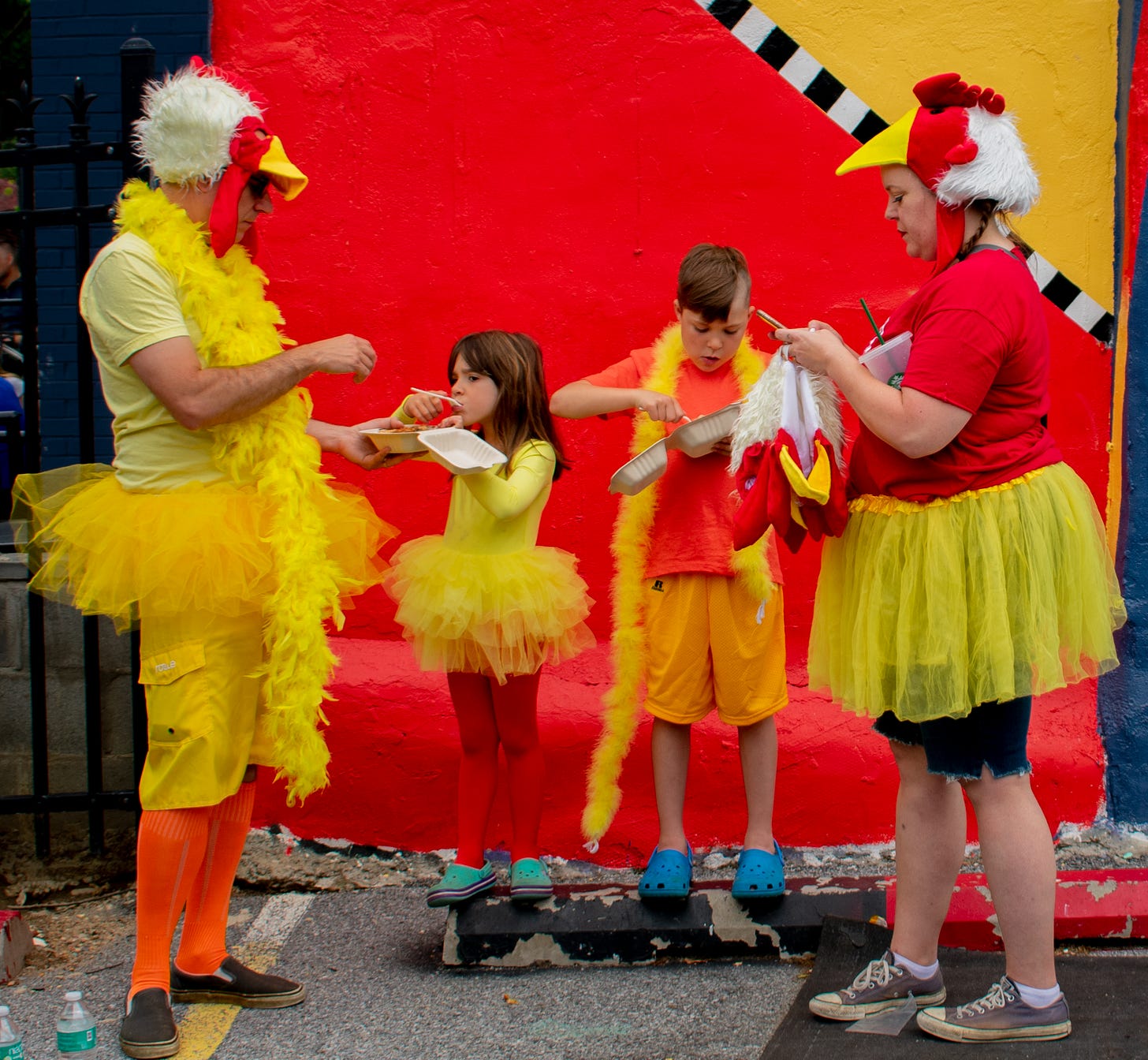
all photos © 2019 Roy Edroso
Washington D.C., I have told you good people repeatedly like a maudlin drunk you invite to parties out of misguided sympathy and whose ancient complaints you heroically indulge, is small and dull and full of bureaucrats and technocrats who cast a white suburban mall pall over the place. But it has its compensating virtues, and every so often it not only acts like a real city but gives the act a specific D.C. spin that makes a local proud.
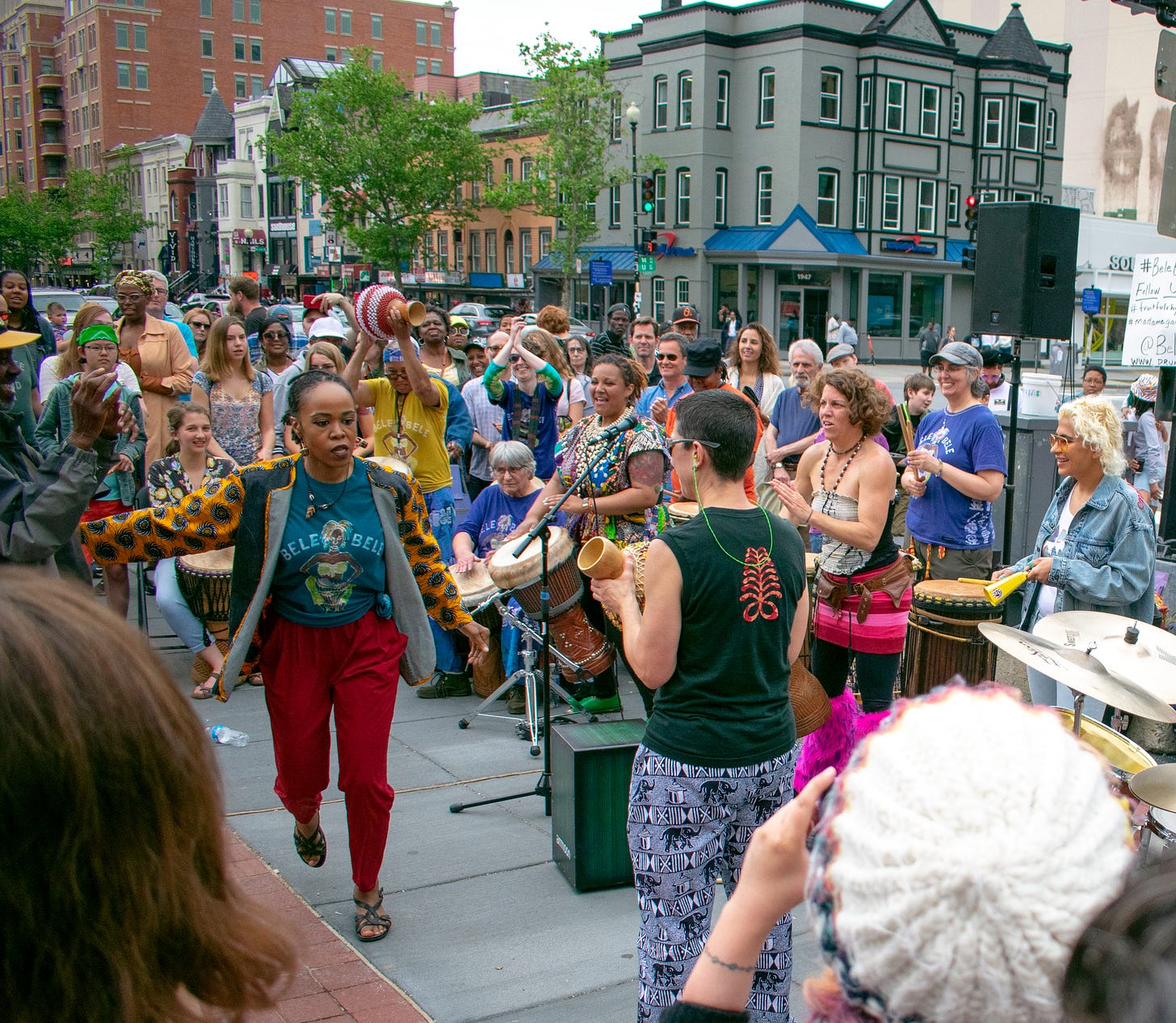
The annual Funk Parade is one such event, a vestige of pre-gentrification Washington that has not yet been pushed out of sight. It marries the usual street festival commerce and neighborhood boosterism with a real block party atmosphere. There’s some soul, some rap, some guitar rock, some passa passa, some steel band, some marching band — something for everyone in the family, nuclear or extended, which is to say all are welcome who come correct, drop-ins as well as old-timers.

I didn’t make the march proper this year but took in the outdoor performances along the route, some in set-aside staging areas but some just blossoming on street corners. D.C.’s not big for busking and Lord knows the thoroughfare known as the U Steet Corridor does not normally show much of it, but it was nice to see musicians serenading brunchers without anyone wondering whether they should call the authorities.
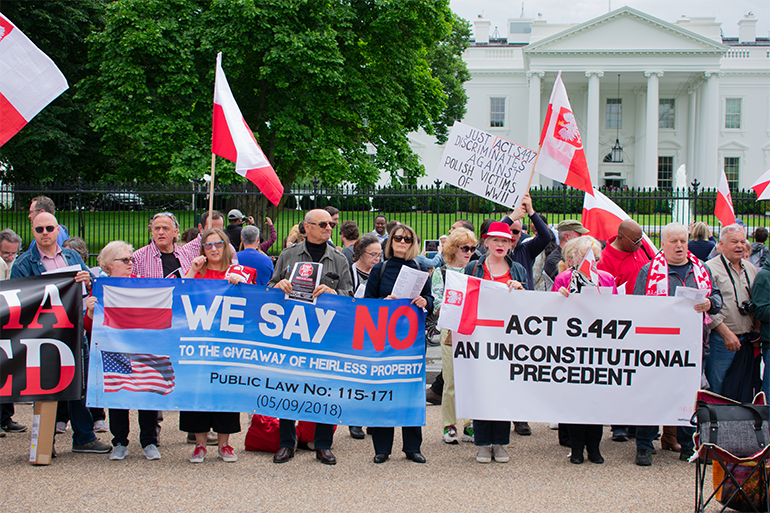
Earlier that day I took in a demonstration against a law signed by Trump. The protesters were not pussy-hatted liberals but conservative Polish-American activists dressed like suburbanites on their way to church. Their beef was with the Justice for Uncompensated Survivors Today (JUST) Act that has the State Department looking into more reparations for descendants of the Holocaust. The protesters were almost certainly rightwing Trump fans — there was a prominent, gory anti-abortion display just off to one side of the anti-JUST posters and flags — but rightwing Poles are also a little sore about their reputation as enthusiastic Jew-killers during the Second World War and, to hear the speakers tell it, also feel like they’ve already ponied up enough compensation. When they addressed Trump in asking for the law to be repealed, they did so respectfully; when their anger flared it was directed at the United States, not at their White House buddy who, perhaps misled (or, more likely from my point of view, assured there was something in it for him), had briefly forgotten his friends.
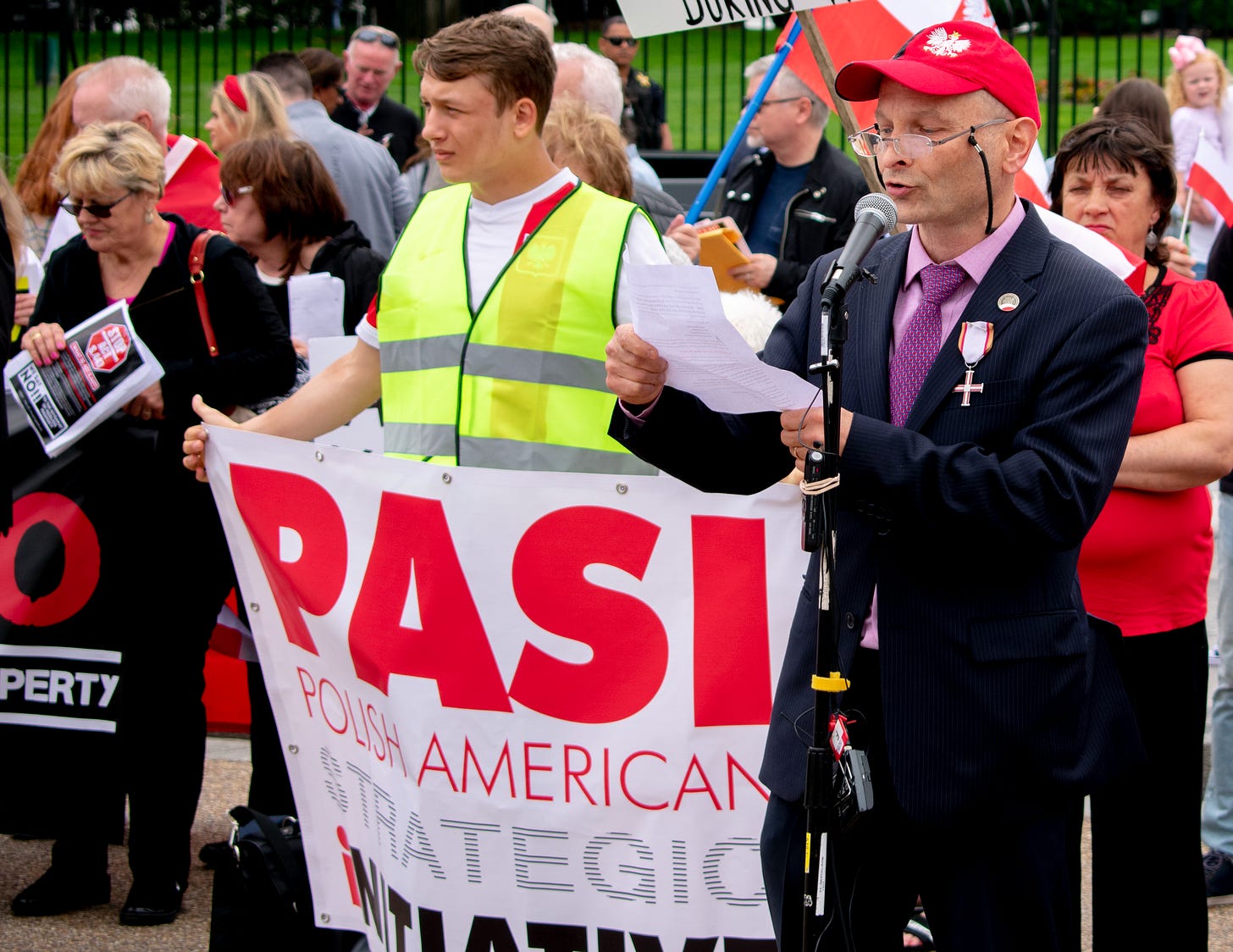
These folks may well have a point about international law — one of the speakers kept insisting that under common law “heirless” property reverts to the state, not other interested parties — I have no idea. But I was there for about an hour and heard (along with a lot of Polish — some of this was apparently not for the ears of the outsiders) many aggrieved references to Poland’s suffering in the War which seemed to shade into a weird competition with the Jews, whom most of us think had it worse. (Poland doesn’t like when you refer to “Polish death camps” and has even made such references illegal in that country. Word to the wise if you’re vacationing in Krakow!) One lady said at the demo that Poles who hid Jews in the War were killed, and then, seeming to realize how that might sound, sputtered a while before telling us she worked in immigration law and had helped many Jews in that capacity. I can only imagine what these folks thought about the related Warsaw demo the same weekend — one guy seemed proud to announce that 20,000 people attended, but with protester quotes like “Americans only think about Jewish and not Polish interests” being circulated by, of all outfits, Fox News, they may feel it was ultimately counterproductive. Then again, it’s probably good for Poland’s super-right-wing nationalist movement that will eventually combine with other European fascist movements to kick off World War III and destroy civilization. So, silver linings!
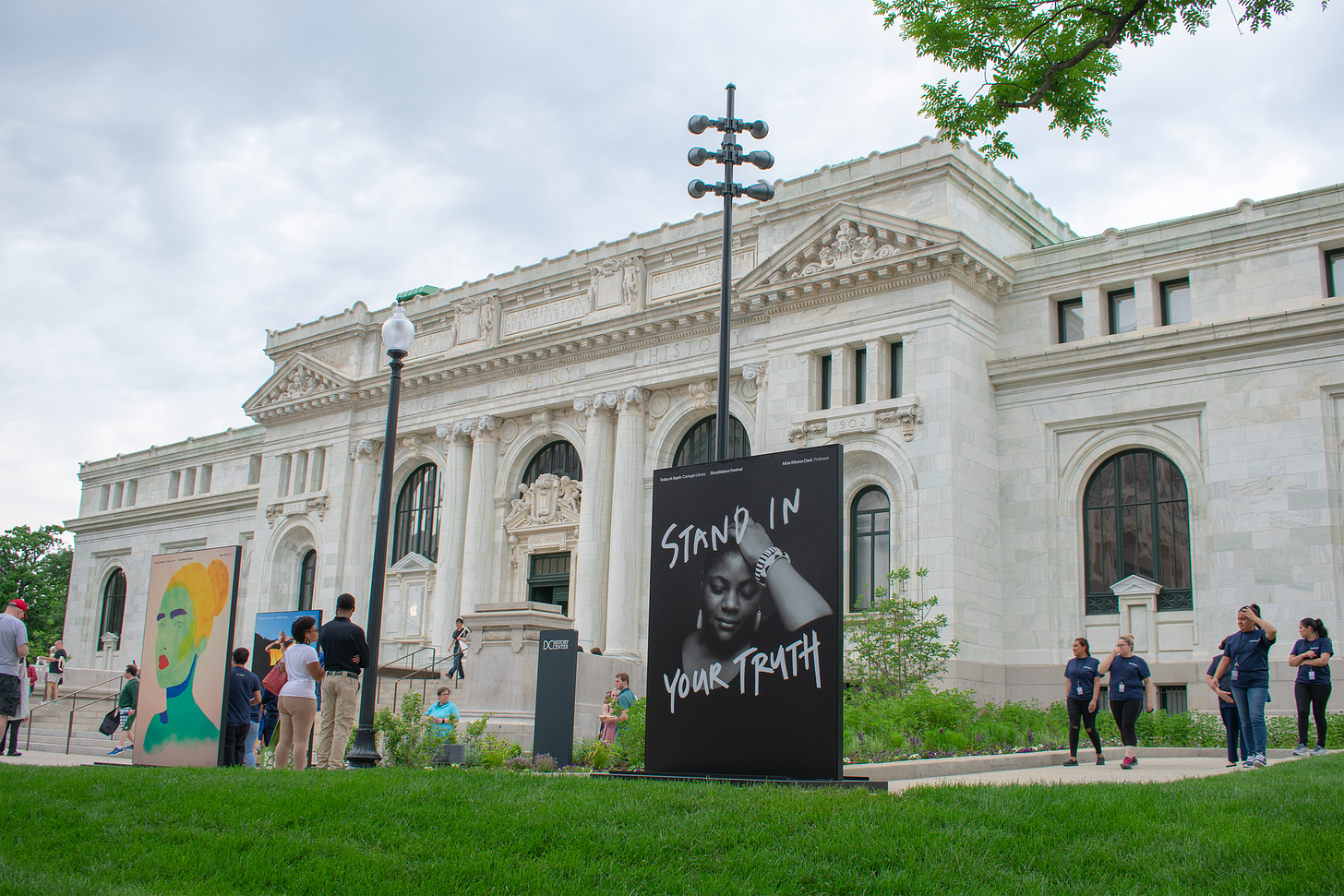
Also dropped by the opening weekend of the Carnegie Library Apple Store. Actually maybe we’re not supposed to think of it as a “store” — “We should probably come up with a name other than ‘store,’ because it’s more of a place for the community to use in a much broader way,” Apple CEO Tim Cook told the Washington Post. They sure don’t want this to look like a regular commercial venture; Apple poured millions into rehabbing the old Beaux-Arts gem, giving the Historical Society of Washington D.C. and the Kiplinger Research Library a gorgeous new home for pretty much free, and have scheduled a bunch of artistic and community-centric activities for the opening weeks — when I swung by the “StoryMakers Festival” was in session, and a young woman was talking about going on a date, or at least she seemed to be from what I could make out; though several customers (excuse me, community members) were listening attentively, the acoustics of the place were strictly monkey-house and the flood of voices from other corners of the non-store played hell with my nerve deafness. But at one point I heard great applause, so I guess she reached them.

There are also some “DC History” exhibits, most panoramic photos like the Washington Senators posing with the Yankees before an old-time World Series, and black high-school students of the segregation era posing in white shirts.

(There are several mentions in signage of “The Big Picture,” which I assume is meant as a link to the recent iPhone photography campaign.
The exhibit also mentions the history of the library: “In 1962, when this photograph of the Carnegie Library was taken, the facility was overcrowded and inefficient,” we are informed. One has to wonder if there was no genuinely public use that could have been made of the place before super-gazillionaires came on the scene. Carnegie had endowed it as a public library. If it was really too overcrowded and inefficient for a main branch, couldn’t it have been a community center? Or a University of the Streets? Was there some other reason than efficiency that its vast white marble was not turned over to the black working class?
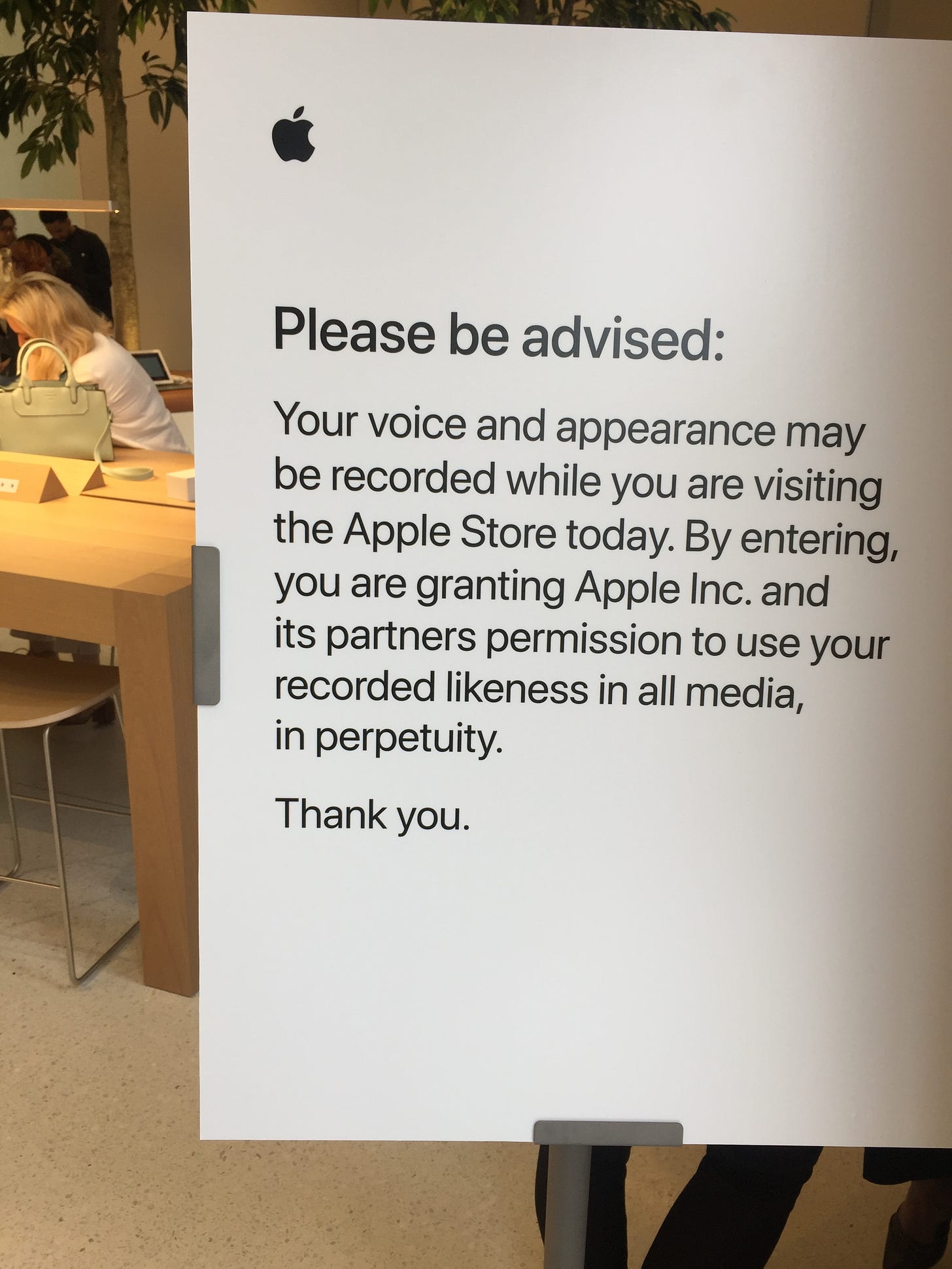
Well, things were what they were; now Apple is making things good for the community. Green-shirted Apple acolytes swarmed, helpful but not intrusive, like the back waiters and busboys at an old-fashioned four-star restaurant. And they weren’t the only ones. As I surveyed the goods in the museum shop, a Historical Society Board of Trustees member and a Librarian, identified by name-tags, confronted me with bright smiles to fill me with facts about the library, its history, and its conversion. Why, I thought behind my reciprocal smile, were they doing this for me? Do they somehow know I’m media, after a fashion? How would they know? Do they recognize me? Or did they read in on my phone? All these greenshirts smiling at me — what do they know about me?
I left, but not without buying a power cord and a plug. Cost me fifty bucks.



With that sign in the doorway, is one allowed to wear a mask or, heaven forbid, a burka in those hallowed halls?
Obligatory JFK quote: “A city of southern efficiency and northern charm.”